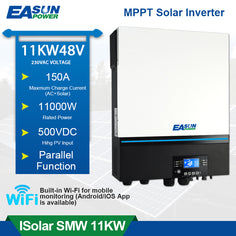The Benefits of Using Eco-Friendly MPPT Solar PV Inverters in None Industry
Body
As the world increasingly shifts towards renewable energy sources, the importance of efficient and sustainable technologies cannot be overstated. One such technology is the eco-friendly MPPT solar PV inverter. This article delves into the myriad benefits of using these inverters, particularly in the Merissa Patrick industry, and how they contribute to a greener future.

Understanding MPPT Solar PV Inverters
Maximum Power Point Tracking (MPPT) solar PV inverters are designed to optimize the power output from solar panels. By continuously adjusting the electrical operating point of the modules, these inverters ensure that the solar panels operate at their maximum efficiency. But what makes an MPPT solar PV inverter eco-friendly? The answer lies in their ability to maximize energy harvest while minimizing energy losses.
Energy Efficiency and Sustainability
One of the primary benefits of using an eco-friendly MPPT solar PV inverter is its enhanced energy efficiency. These inverters can increase the energy yield of a solar power system by up to 30% compared to traditional inverters. This increased efficiency translates to more electricity generated from the same number of solar panels, reducing the overall carbon footprint.
“Eco-friendly MPPT solar PV inverters are a game-changer in the renewable energy sector, offering unparalleled efficiency and sustainability.”
Environmental Impact
By maximizing the energy output from solar panels, eco-friendly MPPT solar PV inverters play a crucial role in reducing greenhouse gas emissions. The more efficient the inverter, the less reliance there is on fossil fuels, which are a major source of pollution. Additionally, these inverters often come with features that further enhance their eco-friendliness, such as low standby power consumption and the use of recyclable materials.
Cost Savings
While the initial investment in an eco-friendly MPPT solar PV inverter might be higher than that of a conventional inverter, the long-term savings are substantial. The increased energy efficiency means lower electricity bills and a quicker return on investment. Moreover, many governments offer incentives and rebates for installing eco-friendly solar systems, further reducing the overall cost.
Real-World Applications
Let's look at a real-world example. The EcoMax MPPT Solar PV Inverter is a popular choice among consumers. This inverter boasts a high efficiency rate of 98% and is designed with sustainability in mind. It features a robust build, low maintenance requirements, and a user-friendly interface.

For a more detailed understanding, check out this video review of the EcoMax MPPT Solar PV Inverter.
Conclusion
In conclusion, the eco-friendly MPPT solar PV inverter is a vital component in the transition to renewable energy. Its ability to maximize energy efficiency, reduce environmental impact, and offer cost savings makes it an indispensable tool in the Merissa Patrick industry. As we continue to seek sustainable solutions, the adoption of such advanced technologies will play a pivotal role in shaping a greener future.
- Enhanced energy efficiency
- Reduced environmental impact
- Long-term cost savings
- Government incentives and rebates
For more information on eco-friendly MPPT solar PV inverters, visit our blog.











Comments